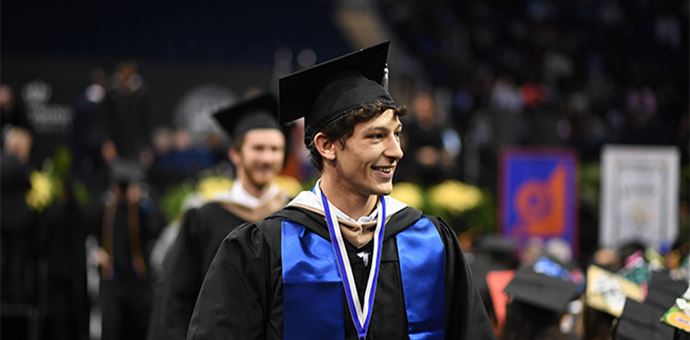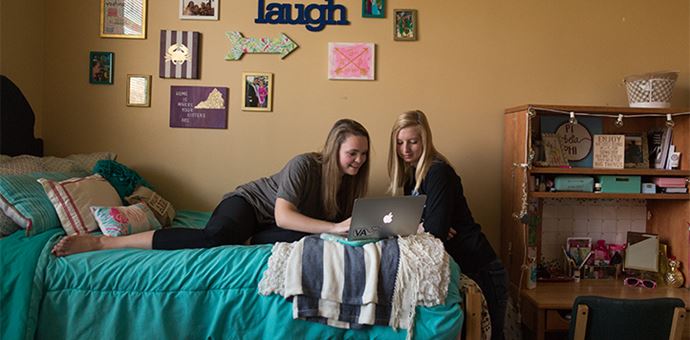Donor Spotlight: Harry B. Adreon Continues His Wife's Legacy Through a Scholarship

Harry Adreon grew up at the corner of Gates and Colley avenues in Norfolk. With his father working at H.B. Gilpin Company, a wholesale pharmaceutical company, it wasn't surprising that, as a student at Maury High School, Harry was attracted to young Beatrice "Bea" Rice, who planned to become a pharmacist.
Following high school, Harry enrolled in the Norfolk Division of William & Mary, now ODU, and Bea went to Mary Washington College to major in chemistry. The two continued to date long-distance. Immediately after graduating from ODU, Harry enlisted in the Marine Corps Reserve as a private and spent the summer in weekly drills at the Amphibious Base at Little Creek.
In the fall, Harry moved to Blacksburg to study architecture at VPI, now Virginia Tech. He received his undergraduate degree in1950 and stayed on to complete his master's degree in 1952. Meanwhile, Bea graduated from MWC and moved to Richmond to begin pharmacy school at the Medical College of Virginia, one of only four women in a class of 85—a staggering, but common, ratio at the time.
With his master's degree in hand, Harry entered the Marine Corps' Officer Candidates School in Quantico, and that December, with school finally behind them, Harry and Bea were married at St. Andrew's Episcopal Church in Norfolk.
Harry Adreon youngFollowing Harry's discharge as a Marine captain, the Adreons bought a house in Alexandria, where Harry began his career as an architect, specializing in medical buildings and nursing homes. Although warned at graduation that most companies wouldn't employ a professional woman, Bea worked as a pharmacist at the Washington Clinic, a private diagnostic and clinical center, for the next 18 years.
Their lives were happy, especially during the many weekends spent at their cottage at Calvert Cliffs, Md., where they enjoyed sailing on the Chesapeake Bay.
Though her own career was going well, in the early 1970s, Bea felt a need to do more for her clients than fill their prescriptions. Many were confused about their prescription drugs and the possible interactions among them and between them and over-the-counter drugs. While she wanted to continue her work as a pharmacist, she also saw a need to offer counseling, something pharmacists were not allowed to do. Determined to expand her role, Bea enrolled at George Washington University, where she earned a master's degree in special studies, with concentrations in counseling, management sciences, and women's studies. After her graduation in 1976, she was invited to stay as a consultant, counselor and teacher in the medical school's gerontology program.
Still unable to offer the combined services of a pharmacist and counselor, though, Bea launched her own business, Pharmacy Counseling Services Inc. Testing a hunch, she offered her services free to elderly neighbors who needed help reviewing their medications, and she saw her patients return again and again-willing to pay for her services. As her business grew, she moved into an office and consultation space at Harry's firm and acquired a long client list of individuals, universities and long-term care facilities.
In early 2005, Bea began to suffer from weakness and shortness of breath, symptoms of atrial fibrillation that eventually led to congestive heart failure. Sadly, her life was cut short.
To honor Bea's memory, Harry included ODU in his will, with a gift to establish The Beatrice Rice Adreon Endowed Scholarship for Pre-Pharmacy Studies. The scholarship will be awarded to students who share Beatrice's passion for pharmacy as a science and her commitment to helping people live the healthiest lives possible. Wanting to do still more, Harry has already begun to fund the scholarship. He looks forward to meeting Beatrice Adreon Scholars, as a link back to his beloved wife, Bea.
Today, most pharmacies offer private areas where pharmacists can consult freely with their clients. From her early days as a rare female pharmacy student to her later career as a consultant in prescription services, Bea was a vanguard in opening the field of pharmacy to women and in expanding the pharmacist's role beyond simply filling prescriptions. What a splendid model she has left for the Beatrice Rice Adreon Scholars to follow—and what a loving tribute Harry has made through this scholarship!


